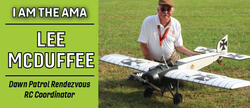Written by Mark Fadely
RC Helicopters
Column
As seen in the March 2013 issue of Model Aviation.
Have you ever wondered how we learn to do what we do when flying our helicopters? Have you questioned what physical and mental processes are going on during our flights?
Some of you are probably already saying, “Here goes Fadely on another meaningless psycho-babble rant!” On the contrary, by reading on I think any pilot, no matter what skill level, will find some useful information.
In the highest levels of every sport there are paid professionals to help athletes condition and prepare for the mental and physical aspects of the activity. On the physical side, these facilitators are called trainers. The players rely on sports psychologists for mental preparation.
The mental and physical demands of sports vary. For example, boxing is physically demanding, while golf is mostly a mental exercise. Likewise, our cool sport is mentally intense with some fine motor skills mixed in.
Our bodies and minds are amazing organic machines. Similar to a super computer, our minds can process and store tremendous amounts of data. Our brains are constantly reprogrammed with software updates. We are each made up of a complex network of connections called nerves. These nerves fill our bodies and our brains.
Anyone who can fly an RC helicopter has done a substantial amount of reprogramming of his or her mind. There is no such thing as a natural RC pilot. We all have to learn the same mental orientations as anyone else.
Each time we perform a skill such as flying an RC heli, we are essentially programming our brains. When we repeatedly do something, our brains learn by making electronic connections that are enhanced each time that same action is repeated.
Some people have prepared neurological pathways already built into their brains. This is especially true for kids who have played a lot of video games. They will have an easier time learning to fly a heli because they already have a lot of the basic programming down.
Babies’ brains are initially in a disorganized state. We are able to live as babies by processes that are preprogrammed into our gray matter before we are born. As the days, months, and years pass, the nerve cells in our brains are programmed with electrical impulses to operate in a distinctly unique manner. This reprogramming continues for as long as we live.

Brian James (center) accompanies Bert Kammerer (R) and Bobby Watts as they drive around in the SmackTalk cart at events to promote their educational RC heli website. The website is loaded with valuable information to help pilots advance.
Now that we’ve heard about all the neural-psycho-babble stuff, what does that mean to us and how can we apply it to our flying? I recommend that each of you hire your own helicopter sports psychologist to work with you every day so you can learn to fly RC helis! I’m just kidding, of course. We can take some knowledge of sports psychology and apply it to our hobby, though. The following paragraphs outline a training strategy that will help our rate of progress and, coincidentally, can also be applied to all aspects of our lives.
Flight Simulator Benefits
There is no doubt that pilots who use computer flight simulators advance more quickly. Although the “feel” of flying will never be the same on a two-dimensional electronic interface, it does program those neurological pathways in your brain. This brain programming is the all-important ingredient to making our flying feel natural. There is no “natural” pilot. The pilots who seem to easily pick up piloting skills have better circuits preprogrammed into their minds. Anytime you are flying on a simulator you are programming your brain. Of course, all people are different and all require different amounts of programming to get those nerve pathways ingrained. Because it takes some work to program our cerebral network, it makes sense to correctly program it the first time. You should not incorrectly learn things or take shortcuts. If you develop bad habits you will have to work harder to unlearn those incorrect methods. Every top pilot whom I have interviewed has stressed the importance of learning the fundamentals correctly so that you have a solid foundation upon which to build.







Comments
Add new comment